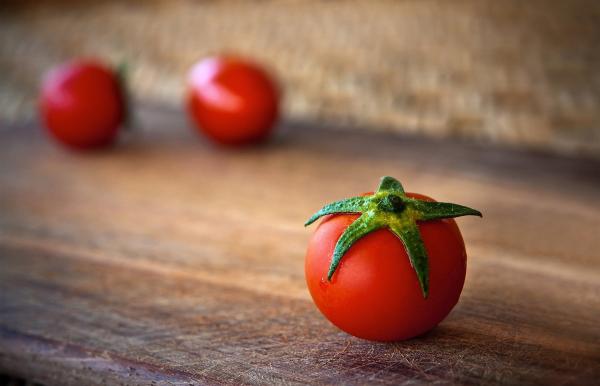In the coming years, a genetically engineered tomato may be your first line of defense against high blood pressure. Biotech company Sanatech Seed has developed and commercialized a tomato variety called the Sicilian Rouge High GABA and began taking orders from Japanese consumers on September 15.
The crop is engineered to produce higher levels of Gamma aminobutyric acid (GABA), which is naturally found in tomatoes and widely consumed as a supplement to help manage hypertension. Unlike many of the natural-health products available online or at CVS, there appears to be decent evidence showing that GABA supplementation does what it's intended to do: reduce high blood pressure, a risk factor for heart disease and stroke.
Anti-GMO groups have reacted to this innovation with unwarranted skepticism. The UK-based activist outfit GM Watch had this to say about Sanatech's creation:
A gene-edited tomato engineered to contain high levels of a sedative substance called GABA has been approved for commercialization in Japan without any safety checks and amid opposition from consumer rights campaigners.
Besides the alleged lack of safety testing, GM Watch fears that the tomato is a “very expensive solution” in search of a problem, since consumers can just buy GABA supplements if they wish. Let's briefly look at each of these concerns, none of which withstand even a little scrutiny.
Untested tomatoes?
As Sanatech explains on its website, Japanese food safety officials regulate gene-edited crops with a relatively light touch. Their reasoning is pretty straightforward: many of the food crops we grow today have had their genomes tweaked in any number of ways, either through traditional breeding or mutagenesis, which involves exposing seeds to ionizing radiation or chemicals to induce possibly thousands of mutations.
None of these products are subject to stricter regulation or labeling; some are even sold as “organic,” meaning you can pay extra for no added benefit if you prefer. If these products don't require more oversight, why would we apply heightened scrutiny to plants engineered with more precise tools? “We wouldn't,” Japan has determined. As long as the new plant variety isn't transgenic (doesn't contain "foreign" DNA), the law only requires that the developer report the product to regulators. No special label is required, though Sanatech will voluntarily label its tomato.
In short, there aren't any extra “safety checks” necessary. GABA-containing foods and supplements are safe to consume, and the breeding method that gave us these tomatoes is unlikely to introduce harmful mutations. In fact, many experts treat CRISPR and other so-called new breeding techniques (NBTs) as refined forms of mutagenesis. A little logic suggests we needn't worry. But if you're still curious, here's a detailed analysis of how the tomato was engineered.
But it's so expensive
Most new products aren't cheap when they first hit the market, but that doesn't stop us from eventually buying them as the prices come down. The same will likely occur in this case if there is demand for the tomato. Sanatech began distributing seedlings for free in March to about 5,000 consumers, which gave the company a good sense of how the public feels about its gene-edited vegetable. [1]
"At first, we had mixed reactions to genome edited foods and we thought it would be difficult to bring them to market because consumers do not fully understand them," company president Shimpei Takeshita said. "But [the] tomatoes have earned a good reputation from those who participated in the cultivation trials."
Who needs another tomato?
That was GM Watch's final question. After all, there's no need for another GE tomato when the public can “Eat natural foods that contain GABA or support its production in the body.” But not everybody around the world has access to these foods, or a taste for them. Therefore, as the scientists who bred the tomato noted,
It is considered that the ideal material is such a thing consumed worldwide and has high potential to produce GABA. Tomato is one of the most produced vegetables in the world and widely consumed in daily diet.
Nonetheless, Japanese shoppers won't be forced to buy these tomatoes. If they sell, great; if they don't sell, that's fine too. As the anti-GMO movement steadily loses its cultural influence, hopefully, Sanatech's tomato will be just one of many gene-edited products consumers will get the choice to purchase.
[1] Some people think tomatoes are fruits, but it depends on how you classify them. I say they're vegetables because I'd never put a tomato in my cereal or a banana in my salad.




